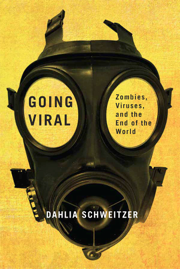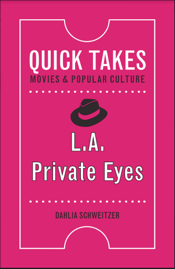
About Dahlia
DAHLIA SCHWEITZER is a pop culture critic, writer, and professor. Described by Vogue as “sexy, rebellious, and cool,” Schweitzer writes about film, television, music, gender, identity, and everything in between. She studied at Wesleyan University, lived and worked in New York City and Berlin, and completed her MA and PhD at the Art Center College of Design and UCLA. She is currently chair of the Film and Media department at the Fashion Institute of Technology in New York City.
In addition to her books, Dahlia has essays in publications including Cinema Journal, Journal of Popular Film and Television, Hyperallergic, Jump Cut, Quarterly Review of Film and Video, and The Journal of Popular Culture. She has also released several albums of electronic music, including Plastique and Original Pickup.

Professor
As a professor of film and media studies, Dahlia exposes her students to a variety of theoretical approaches and cinematic techniques, asking them to approach both with analytical inquisitiveness. Her aim is to pass her own curiosity on to her students, encouraging them to think across their classes and experiences to create intellectual connections between course materials and the world in which they live. She strives to remind her students that the loudest voice is not necessarily correct, and in so doing, helps them find their own.

Media Critic
Declared “one of the world’s leading analysts of popular culture” by renowned author Toby Miller, Dahlia writes about film, television, music, gender, identity, and everything in between. Her work can be found across mainstream, academic, and emergent channels in both long and short form. Repeatedly drawn to popular culture, Dahlia loves to analyze and unpack cultural artifacts in order to explore how they reflect social and historical issues, as well as looking at how they reinforce or interrogate common cultural assumptions.

Author
Dahlia has written numerous books exploring aspects of film and television. Regardless of the topic—serial killers, private detectives, or even zombies—all of her writing engages directly with questions of self versus other, private versus public space, examining depictions of gender, identity, and race. She traces how these depictions evolve and examines what they mean about our changing world. In her latest project, Dahlia explores the ways haunted homes have become a venue for dramatizing anxieties about family, gender, race, and economic collapse.
Blog
Keeping Sex Complicated
Dating sucks everywhere, but it sucks harder in LA, and it sucks more now than ever. A few months ago, before meeting someone for the very first time, as we were texting to confirm plans, he asked if I enjoyed giving blow jobs. When I didn't want to answer, he called me a prude. (I canceled the date.) On another first date, a guy asked me when the last time was that I had had sex and how often I masturbated. On a different date, a guy asked me if I could give him an ETA for when we’d have sex....
“You Don’t Have to Take Everything Off to be Beautiful.”
This Sunday, I will be moderating the Sex Panel at the West Hollywood Book Fair. There are several authors on the panel, and their books are as varied as they are. One book is an autobiography of a woman’s experience in the world of hardcore porn, another is the history of burlesque in America, while the third explores the often stigmatized world of the "fat girl" in a book of pin-up style photographs of self-declared “fat girl” April Flores.The books, which I powered through in preparation...
On Hitchcock, Giving Up, and Being an Artist
I meant to watch Veep this weekend, but instead I watched Hitchcock because it showed up on the screen first. The movie, as a whole, wasn’t very good, and the lack of respect for factual accuracy made me mad, but something, in particular, made a very strong impression on me. I loved Hitchcock’s resilience and determination in the face of a movie studio that had no interest in supporting him. He believed in Psycho so much that he simply refused to give up. If it meant he had to fund the movie...




